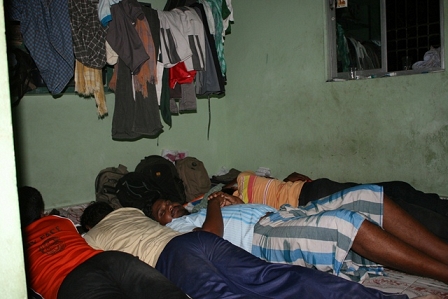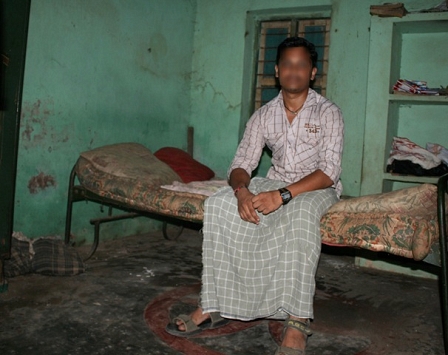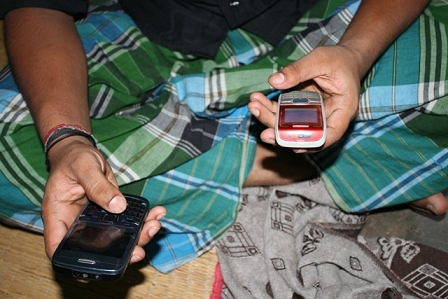Erstellt am: 26. 9. 2012 - 11:24 Uhr
"They are not living, they are just suffering"
This week`s riot at a northern Chinese electronics factory has highlighted the rising tensions between managers facing stiff deadlines and workers who feel that they are being pushed beyond the limits of their endurance to produce our consumer gadgets for meagre pay. 2,000 employees were involved in the violence, 40 people were apparently injured and production was stopped for 24 hours. The factory was owned by Foxconn, which supplies electronics for brands such as Apple, Microsoft, Nokia and Dell.
The story struck my attention because I had just been speaking to two Austrian activists from the fair trade pressure group Südwind who had visited workers from Foxconn and Nokia in Tamil Nadu in southern India this year.
Nora Holzmann and Christine Schröder interviewed several workers in factories near Chennai and gathered a depressing picture of life on the hi-tech assembly lines. They describe a sort of industrial dystopia that was evoked by Charles Dickens but that has now been transported to the digital age.

südwind
"The life of mobile phone workers is a very exhausting one," says Holzmann. "They have to stay in the same position every day for long hours, often standing for 8 hours and are only allowed short toilet breaks." In addition to their wages, the workers are provided with food coupons for lunch by their employers, but Schröder describes the portion as being so paltry that workers have been known to faint with hunger.
The workers interviewed by Südwind complained about being treated like machines rather than human beings. 80% of them share cramped rooms with other workers, all of them sleeping on the floor. "They are not really living, but suffering," says Schröder, who was appalled at the living standards. "They share a kitchen between eight people and have no running water in the house." Some of the accommodation inspected by the activists had just one toilet for an entire housing block.
A Carousel of Exhaustion
Holzmann says that many workers share this cramped accommodation in shifts. Night-shift workers sleep during the day, then roll up their sleeping mats and store them in a corner to make way for their exhausted flat-mates when they return from the day-shift. It`s a carousel of exhaustion. The only entertainment is television. Many employees of the factories, who are typically well-qualified, send much of their pay packets back to their families and dependents in their home villages. Little is left for enjoyment; workers told Südwind that a simple trip to the cinema is an unaffordable luxury.

südwind
Nokia vehemently rejects the criticism. No spokesperson was available to directly answer my questions but the company issued a written statement stating that "Nokia takes its responsibility to protect its workers very seriously." The company shows a report from the ethical observer group Finnwatch which found that "Nokia workers and trainees enjoy the best wages in the region" and that "these wages are well above the local minimum wage."
How Much Do You Need To Live?
According to Südwind the workers in the south Indian electronic factories earn between 5,500 and 11,000 rupees, or between 83 and 165 Euros, per month. Nora Holzmann concedes that this is indeed above the minimum legal wage for the region, but she insists that the bar has simply been set too low. "There is the concept of the living wage," she says. "That means the wage that people actually need to have a good and healthy life. In India there is a huge gap between the minimum wage and the actual living wage."
Nokia feels unfairly singled out by the criticism, claiming it is a market leader. Südwind is at pains to point out that although they specifically focused on a Nokia factory during their trip to south India, their criticism is aimed at the entire industry rather than at a single company. Their research suggests that the situation is similar across all mobile and smart phone manufacturers. "Sadly there is no brand that we could recommend", says Holzmann.

südwind
Every year around 1.8 billion mobile phones or smart phones are sold world-wide. Here in the western developed countries, they have become so affordable that some people buy a new phone as often as they buy a new pair of jeans. Three million mobile phones were sold in Austria alone in 2011, which is not bad for a country of just 8.4 million people. Südwind hopes that consumer pressure here can lead to changes in India and China. "When people go to buy their phone, we want them to ask not just what it can do but how it was made", says Schröder.
Südwind estimates that since only 1% of the costs of producing a mobile phone actually goes to paying the workers, the wages could be doubled without any significant impact of the overall cost of a phone. As Holzmann says "no-one wants to think that someone has suffered for their phone."


